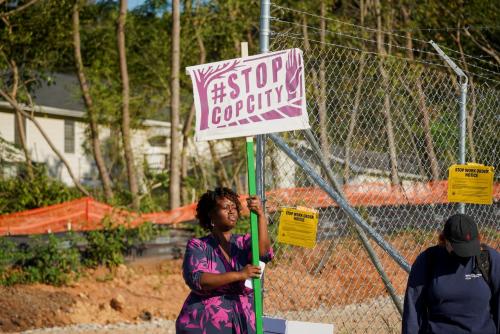Content from the Brookings Institution India Center is now archived. After seven years of an impactful partnership, as of September 11, 2020, Brookings India is now the Centre for Social and Economic Progress, an independent public policy institution based in India.
India’s 100 Smart Cities initiative recognizes the country’s growing metropolitan areas as a frontier for opportunity. Unfortunately, the inability of municipal governments to lead may be the greatest barrier to unlocking their full potential.
Within India’s federalist system of central, state and municipal government, states exercise considerable power in local urban development, resulting in inefficiencies and limited municipal capacity. Addressing these structural problems and leadership shortcomings is of utmost importance for the three cities participating in the U.S.-India Smart Cities partnership—Ajmer, Allahabad, and Visakhapatnam—and beyond.
India’s democracy is historically characterized by centralized decision-making. While a 1993 constitutional amendment called for a transfer of power from state to municipal governments, progress is slow and cities continue to depend on state governments for local leadership. In some cities, state-appointed executives wield supreme decision-making authority. Due to a combination of poor recordkeeping, lack of political will, and weak administrative capacity, localities also struggle to collect property taxes. This reliance on states for revenue creates a cycle of dependency and only further reinforces state power in those communities.
These governance challenges are especially acute around physical infrastructure. Management responsibility is inconsistent, with waste management a municipal responsibility and community planning and water supply often under the purview of state ministries. State-led urban planning is regarded as opaque and ineffective and can be limited in scope, overlooking important infrastructure development needs, project financing, and the relationship between land use and transportation. For example, unbuilt land on the metropolitan fringe receives prioritized new construction, at the expense of improving infrastructure and urban design in existing neighborhoods.
These governance issues matter tremendously when it comes to the emerging concept of smart cities. New technologies alone cannot address India’s urban challenges. While cutting-edge digital products tend to capture the public’s imagination, the real engine of these future-looking concepts is a local government that knows how to execute a plan. Yet in many ways, India’s municipal governments are too disconnected from local decisionmaking and execution.
For India’s smart cities to be successful, they must self-assess and have a clear idea of what they want to be. Fortunately, there is a reference model from India’s recent past. Under a mid-2000s central government urban renewal program, participating cities were required to create comprehensive vision plans. These multi-dimensional city-led plans examined urban development beyond simply land use and zoning. They set a better precedent for what urban planning in India should be, but as a model for smart cities they should go one step further. In Visakhapatnam, the U.S. Trade and Development Agency is already supporting a feasibility study for economic development planning.
These improvements to cities’ strategic capacity will also benefit the private firms looking to deploy their products and investment capital. Cities would move with greater certainty when it comes to private contracts and could develop sustainable revenue streams to pay for advanced technology.
The 100 Smart Cities initiative needs a bottom-up approach, while states need city governments with broader powers and clear economic plans. In India, strong city-level leadership is a core ingredient to advance the long-term urban livability and prosperity that smart cities promise.
The Brookings Institution is committed to quality, independence, and impact.
We are supported by a diverse array of funders. In line with our values and policies, each Brookings publication represents the sole views of its author(s).



Commentary
A governance-first approach to India’s smart cities
January 12, 2016